What Can BioCommunications Do for You?
With a team of video production, graphic design, audiovisual, photography, web development and print services experts, BioCom supports the Health Sciences and UArizona campuses.
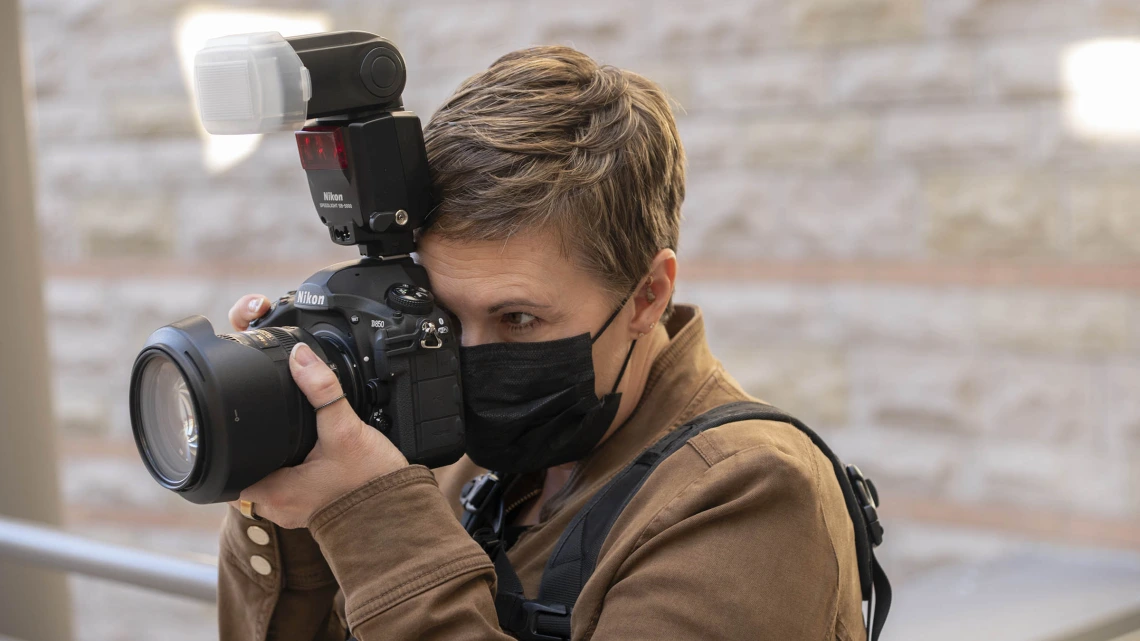
Darcie Elliott is one of two BioCom photographers for hire. Elliot is seen here photographing the College of Medicine – Tucson Class of 2024 White Coat Ceremony.
Imagine you’re a scientist and you need photos for a research poster to present at a conference. You also need help designing and printing the poster. Who do you call?
Or if you’re organizing a symposium that you want to both livestream and record, what do you do?
For faculty, students and staff at the University of Arizona Health Sciences colleges or centers, as well as for the university on main campus, BioCommunications (BioCom) can support your communications and creative services needs.
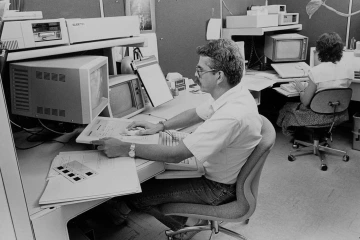
Dave Cantrell, former BioCom graphic design supervisor, using an early computer system to create slides for classroom lectures in the 1980s. This system was a predecessor to modern-day presentation graphics software.
Part of the Health Sciences Office of Communications, BioCom provides everything from audiovisual, video production and video conferencing services to a host of multimedia services such as photography, graphic design, medical illustration, animation, web development, poster design, printing and copying.
The unit was established in the 1970s to provide support for classroom audiovisual services, photography and printing for the UArizona College of Medicine – Tucson, said BioCom director Ricky Bergeron.
“Over the years, BioCom grew from audiovisual services to providing a comprehensive range of creative and technical support services,” said Rita Ellsworth, BioCom director from 2013 to 2019 and current executive director for UArizona Health Sciences creative services and interactive media.
Before the days of PowerPoint, instructors and lecturers used BioCom’s expertise to create “slide tapes” for teaching, which were a “carousel of slides with a voice that was used in the classrooms,” Ellsworth explained. “Service offerings have evolved to meet the more sophisticated needs of the Health Sciences community, with BioCom adding services such as interactive media, multimedia, web development and digital photography. Programmers, videographers, graphics designers, illustrators, and animators were added to the staff over the years to meet the expanding needs of our biosciences community.”
Customer-serviced focused team
Today, BioCom is staffed by a team of 16 professionals who work with people on the Health Sciences campus. They also provide services to main campus.
“One of our biggest strengths is good customer service,” Bergeron said. “We meet with clients, we find out what they need, we give them what they want, and provide them with high quality work.”
Bergeron said that while all the service areas are busy, videoconferencing and audiovisual support continue to be two of BioCom’s most popular services during the pandemic. Many instructors are converting their classes or entire programs to Zoom, video or online, and they want some help with that, he said.
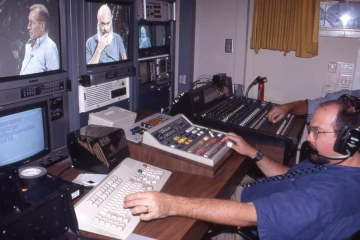
Rick Collins, former BioCom medical television manager, recording a live studio interview with Dr. Andrew Weil in the 1990s. During that time, television broadcast over cable that was connected through Arizona Public Media.
So what does a typical day look like for Bergeron? “I don’t think any day is ever the same. It’s always changing,” he said. “Recently, I was very busy with the Cancer Center’s National Cancer Institute (NCI) site visit. We created presentation videos and prepared rehearsals for their big event.”
On other days, Bergeron might spend hours recording presentations in BioCom’s studio and then more hours editing. He and his team also record Grand Rounds that are uploaded to the colleges’ websites for later viewing.
Following the NCI event, Megan Guthrie, former director of communications and public affairs at the Cancer Center, commended BioCom’s work. “The University of Arizona Cancer Center welcomed the opportunity to partner with BioCom’s high quality services to highlight the remarkable work being done in multidisciplinary cancer research. A special thank you to Ricky Bergeron for video production, Debra Bowles and Edgar Mendoza for graphic design, along with Barry Bernard for information technology support,” she said.
“We appreciate their creative media services and recommend BioCom’s services to University of Arizona campus colleagues,” Guthrie added.
Sharing Health Sciences celebrations
With a background in video production and television, Bergeron has been part of BioCom for almost 21 years, producing videos for the majority of that time before being hired as director in 2019. After all those years, graduate convocations are still his favorite events to work on.
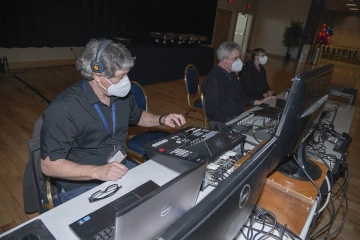
Bergeron (left), Bernard (center) and information technology support center specialist Denise Leahy (right) provide AV support at the College of Medicine – Tucson Class of 2024 White Coat Ceremony in February.
In 2020 when convocations transitioned from in-person to virtual because of the pandemic, Bergeron and his colleague video producer Gilberto Vega produced a convocation video for the College of Medicine – Tucson that involved individually recording all 120 graduates in their studio walking across the “stage” to collect their diploma. They also recorded the various speakers and the keynote address.
“The most memorable part about it for me was that at one point during the convocation the graduates recite their Hippocratic Oath. We did a live Zoom where we had all the students saying the oath at the same time. It was a little scattered, a little crazy, because this was early on in the pandemic with people using Zoom. Even still, it turned out great. Everyone loved it and the students had a chance to see everybody else and do it together.”
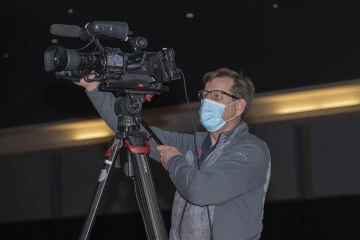
Jeffrey Homoki, BioCom information technology support center specialist, operates the camera at the College of Medicine – Tucson Class of 2024 White Coat Ceremony.
“BioCom evolves with technology,” Bergeron said. “As the technology evolves, we evolve with it. We keep pace with what's going on in the outside world. Because we keep up with the technology, we can provide the services our clients need, even if it requires newer technology.”
BioCom has grown from mainly providing audiovisual support to College of Medicine – Tucson classrooms to now providing a full range of services to all the Health Sciences and university entities. To recover costs, BioCom charges a fee for some of their services at rates set by the university, while other services are free. “If anyone is interested in certain aspects of BioCom, they can reach out to us any time for an estimate.”
For more information about what BioCom can do for you, visit biocom.arizona.edu or visit room 3404 of the Arizona Health Sciences Center.

